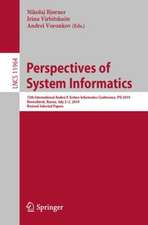Object-Oriented Analysis, Design and Implementation
Autor Brahma Dathan, Sarnath Ramnathen Limba Engleză Paperback – 20 oct 2024
- A sound footing on object-oriented concepts such as classes, objects, interfaces, inheritance, polymorphism, dynamic linking, etc.
- A good introduction to the stage of requirements analysis
- Use of UML to document user requirements and design
- An extensive treatment of the design process
- Coverage of implementation issues
- Appropriate use of design and architectural patterns
- Introduction to the art and craft of refactoring
- Pointers to resources that further the reader's knowledge
All the main case studies used in this book have been implemented by the authors using Java. An appendix on Java provides a useful short tutorial on the language.
| Toate formatele și edițiile | Preț | Express |
|---|---|---|
| Paperback (3) | 179.88 lei 3-5 săpt. | +25.39 lei 6-10 zile |
| Springer International Publishing – 10 noi 2015 | 179.88 lei 3-5 săpt. | +25.39 lei 6-10 zile |
| Universities Press – 20 oct 2024 | 301.20 lei 3-5 săpt. | +27.40 lei 6-10 zile |
| Springer Nature Switzerland – 9 feb 2025 | 341.22 lei 3-5 săpt. | +31.97 lei 6-10 zile |
Preț: 301.20 lei
Preț vechi: 376.50 lei
-20% Nou
Puncte Express: 452
Preț estimativ în valută:
57.63€ • 62.80$ • 48.57£
57.63€ • 62.80$ • 48.57£
Carte disponibilă
Livrare economică 02-16 aprilie
Livrare express 18-22 martie pentru 37.39 lei
Preluare comenzi: 021 569.72.76
Specificații
ISBN-13: 9789393330765
ISBN-10: 939333076X
Pagini: 508
Dimensiuni: 245 x 161 x 27 mm
Greutate: 0.7 kg
Editura: Universities Press
ISBN-10: 939333076X
Pagini: 508
Dimensiuni: 245 x 161 x 27 mm
Greutate: 0.7 kg
Editura: Universities Press
Cuprins
Preface to the Second Edition.- Preface to the First Edition.- Part I: Basic Object-Oriented Concepts.- Introduction.- Basics of Object-Oriented Programming.- Relationships Between Classes.- Language Features for Object-Oriented Implementation.- Part II: Introduction to Object-Oriented Analysis, Design, Implementation and Refactoring.- Elementary Design Patterns.- Analysing a System.- Design and Implementation.- How ‘Object-Oriented’ is Our Design?.- Part III: Advanced Concepts in Object-Oriented Design.- Exploring Inheritance.- Modelling with Finite State Machines.- Interactive Systems and the MVC Architecture.- Designing with Distributed Objects.- The Unified Modelling Language.- Appendix A.-Index
Notă biografică
Brahma Dathan is an associate professor in the Department of Information and Computer Sciences at Metropolitan State University, Minnesota. He obtained his BS in engineering with special focus on electronics and communication from the University of Kerala, MTech in computer science from IIT Madras and PhD in computer science from University of Pittsburgh.
Sarnath Ramnath received his BTech and MTech degrees from IIT Delhi in 1984 and 1987 respectively, and his PhD in Computer Science from SUNY, Buffalo, in 1994. His areas of interest include algorithm analysis and design, data-structures, computational geometry and object-oriented software design. He is currently Professor and Chair of the Department of Computer Science at Minnesota State University, St Cloud, Minnesota, USA.
Sarnath Ramnath received his BTech and MTech degrees from IIT Delhi in 1984 and 1987 respectively, and his PhD in Computer Science from SUNY, Buffalo, in 1994. His areas of interest include algorithm analysis and design, data-structures, computational geometry and object-oriented software design. He is currently Professor and Chair of the Department of Computer Science at Minnesota State University, St Cloud, Minnesota, USA.
Textul de pe ultima copertă
The second edition of this textbook includes revisions based on the feedback on the first edition. In a new chapter the authors provide a concise introduction to the remainder of UML diagrams, adopting the same holistic approach as the first edition.
Using a case-study-based approach for providing a comprehensive introduction to the principles of object-oriented design, it includes:
All the main case studies used in this book have been implemented by the authors using Java. An appendix on Java provides a useful short tutorial on the language.
Using a case-study-based approach for providing a comprehensive introduction to the principles of object-oriented design, it includes:
- A sound footing on object-oriented concepts such as classes, objects, interfaces, inheritance, polymorphism, dynamic linking, etc.
- A good introduction to the stage of requirements analysis
- Use of UML to document user requirements and design
- An extensive treatment of the design process
- Coverage of implementation issues
- Appropriate use of design and architectural patterns
- Introduction to the art and craft of refactoring
- Pointers to resources that further the reader's knowledge
All the main case studies used in this book have been implemented by the authors using Java. An appendix on Java provides a useful short tutorial on the language.
Caracteristici
Contains a complete reference for UML Covers implementation issues Provides a sound footing on object-oriented concepts such as classes, objects, interfaces, inheritance, polymorphism, dynamic linking etc. Includes supplementary material: sn.pub/extras













